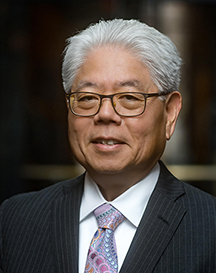Incoming Class
History and Renaming
The Renaissance School of Medicine at Stony Brook University was founded in 1971 as the Stony Brook University School of Medicine.
In 2016, the school entered into a strategic partnership with Mount Sinai Health System and the Icahn School of Medicine in Manhattan for collaborative education, research and clinical care programs.
In 2018, the institution was renamed the Renaissance School of Medicine at Stony Brook University. The change was in recognition of more than $1 billion in generous philanthropic investments by over 100 Renaissance Technologies families in Stony Brook University – including the Renaissance School of Medicine – over the past 41 years.
Medical Education
The Renaissance School of Medicine at Stony Brook University — also known as the RSOM — is a public medical school providing students with a uniquely diverse patient population for training to provide medical care in an increasingly global society.
Comprised of 25 academic departments (eight basic science, 17 clinical), the RSOM’s responsibilities include the preclinical and clinical education of students in the five schools of the Health Sciences — the School of Medicine, the School of Dental Medicine, the School of Nursing, the School of Social Welfare and the School of Health Technology and Management — as well as the Program in Public Health/MPH, plus the instruction of students across other schools in the University. The RSOM provides graduate, post-graduate and continuing education degrees.
The school’s program includes clinical outreach, global health research, clinical electives and exchange programs for medical students that are facilitated by the Office of Global Medical Education, which has more than 20 partners around the world.
Some of the Renaissance School of Medicine’s key attributes include:
- 500+ medical students trained annually
- 750+ medical residents and fellows trained annually
- 5 main care sites where residents and fellows train in various specialties:
- Stony Brook University Hospital
- Stony Brook Children’s Hospital
- Stony Brook Southampton Hospital
- Northport Veterans Affairs Medical Center (VAMC)
- Nassau University Medical Center (NUMC)
- 68 ACGME (Accreditation Council for Graduate Medical Education) accredited residencies and fellowships in a broad range of specialties
- International rotations for residents in the departments of Medicine, OB/GYN, Pediatrics, Anesthesiology and Emergency Medicine at various partner sites, including Chile, China, Ecuador, Japan, Madagascar, Peru, Rwanda and Uganda
Research
The Renaissance School of Medicine conducted over $250 million in funded research during 2022-2023, including sponsored research programs in neurological diseases, cancer, cardiovascular disorders, biomedical imaging, regenerative medicine and infectious diseases, among other topics. The discoveries made by the RSOM’s basic and clinical researchers have improved the quality of life and contributed to the knowledge base of many Long Islanders.
The Medical and Research Translation (MART) building houses Stony Brook University Cancer Center. There, researchers and clinicians collaborate on building the most comprehensive, integrated and unified team with one singular purpose: to investigate, discover and drive innovations in cancer treatment.
As a major research university, we bridge the gap between clinical laboratory sciences and healthcare delivery. Our clinical staff is leading the industry by applying basic findings to a wide variety of conditions and diseases.
Five facts about the medical research done at RSOM:
The 2023 edition of U.S. News & World Report ranked the Renaissance School of Medicine 58th in the Best Research category.
Part of Stony Brook University, one of 71 members of the Association of American Universities (AAU), the invitation-only organization of the best research universities in North America.
Four major innovations by Stony Brook researchers:
- Developed the Nobel Prize-winning technology that led to the MRI
- Helped develop the technology for PET scans
- Created technology for 3D virtual colonoscopy
- Discovered the cause of Lyme disease
Groundbreaking new medications developed by Stony Brook researchers include:
- ReoPro®, a drug used for cardiac angioplasty
- Periostat®, a drug used for periodontal disease
- Xiaflex®, a drug used to treat Dupuytren’s disease
30% increase in research expenditures since 2010, and a 46% increase since 2016
Additional Information may be found at Stony Brook Medicine's:
Department of Research Informatics
Office of Scientific Affairs
Office of Research Compliance
RSOM residents deliver medical care at Stony Brook Medicine, which includes:
- More than 33,000 inpatient visits
- More than 104,000 emergency room visits
- More than 950,000 outpatient visits
Growth and Development of Faculty and Scholars
The Renaissance School of Medicine has seen:
- 22.2% increase in faculty over the past five years (from 966 to 1,180)
- 10 faculty selected as inaugural members of Donoho Academy of Clinical and Educational Scholars (ACES) — funded by a generous gift from Miki and David Donoho — to provide continuous career development for clinician-educators.
Leadership
 Peter Igarashi, MD, was named the Dean of the Renaissance School of Medicine at Stony Brook University beginning September 12, 2022.
Peter Igarashi, MD, was named the Dean of the Renaissance School of Medicine at Stony Brook University beginning September 12, 2022.
A nationally recognized nephrologist, physician-scientist and medical-education innovator, Dr. Igarashi joined Stony Brook from the University of Minnesota Medical School, where he served as the Nesbitt Chair, Professor and head of the Department of Medicine. In this role, he oversaw more than 600 full-time and affiliate faculty, 100 adjunct faculty, and 240-plus residents and fellows. During his tenure, Dr. Igarashi increased National Institutes of Health (NIH) funding to the institution by 60 percent, worked to nearly eliminate gender compensation disparities, appointed women to prominent leadership positions, developed new multidisciplinary programs and created a new Office of Faculty Affairs and Diversity.
An active NIH-funded physician-scientist with research interests in polycystic kidney disease (PKD), transcriptional regulation, epigenetics and kidney development, Dr. Igarashi is the recipient of more than $25 million in NIH grant support over the years. He has published widely in medical periodicals (in English and Chinese), authoring nine chapters in textbooks as well as more than 100 peer-reviewed journal articles.